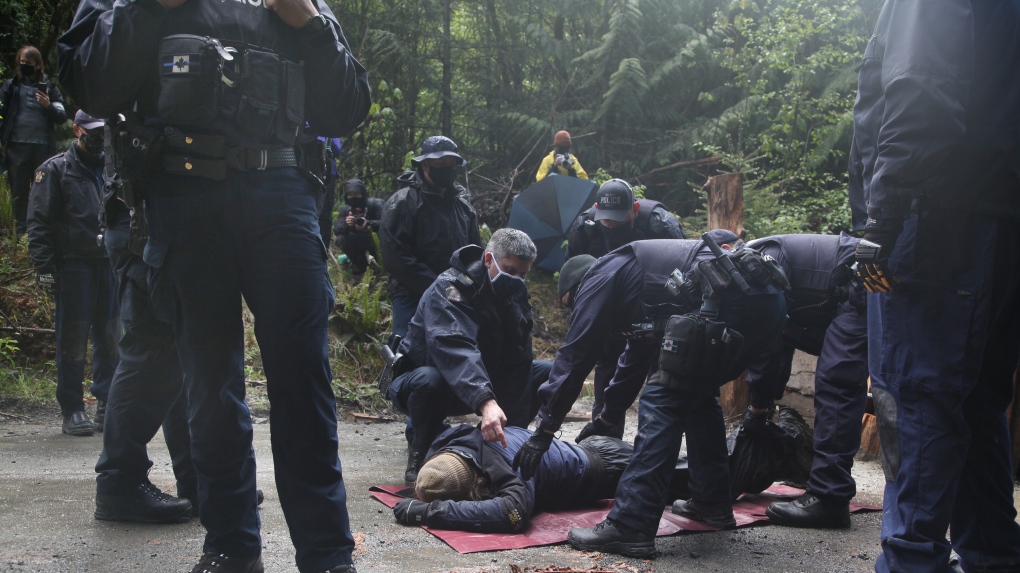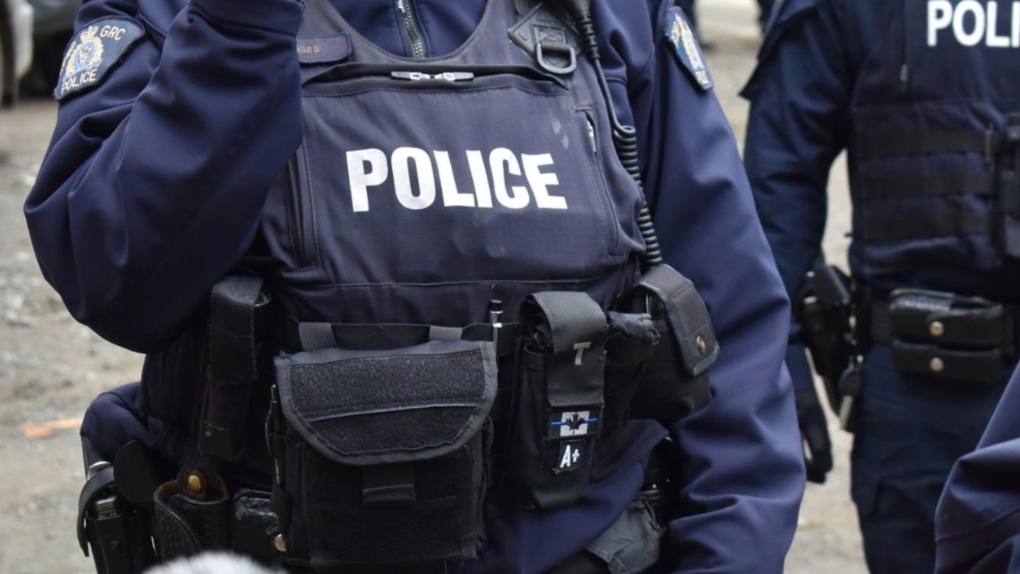Mounties criticized for wearing 'thin blue line' patches at B.C. old-growth logging protests
Some RCMP officers who are enforcing a British Columbia court injunction to remove old-growth logging blockades on Vancouver Island are wearing the controversial "thin blue line" patch on their uniforms, despite an official RCMP directive against the insignia.
RCMP headquarters told the Mounties in October they could no longer display the patch depicting a black and grey Canadian flag with blue stripe through it while on duty.
The directive opened a rift between RCMP brass and the National Police Federation, the union representing nearly 20,000 RCMP officers.
The union rejected the directive and said it would supply the patches to all its frontline members and "assist in defending any member who faces disciplinary action" for wearing it.
Some metropolitan police forces in Canada, including Ottawa and Victoria, have since banned the insignia, while others, including Montreal, have said they are reviewing its use.
The patch "delineates the important and often dangerous role police officers play in providing a barrier between social order and chaos," the National Police Federation said in a statement on Oct. 12.
But others, including a researcher who studies policing at the University of Victoria, say the patch fuels tensions between police and protesters by reinforcing an us-against-them mindset, and politicizes the role of law enforcement.
 RCMP officers, including two wearing the 'thin blue line' patch, arrest a man during an anti-logging protest in Caycuse, B.C. on Tuesday, May 18, 2021. THE CANADIAN PRESS/Jen Osborne
RCMP officers, including two wearing the 'thin blue line' patch, arrest a man during an anti-logging protest in Caycuse, B.C. on Tuesday, May 18, 2021. THE CANADIAN PRESS/Jen Osborne
RCMP officers, including two wearing the 'thin blue line' patch, arrest a man during an anti-logging protest in Caycuse, B.C. on Tuesday, May 18, 2021. THE CANADIAN PRESS/Jen Osborne
British Columbia RCMP spokesperson Sgt. Chris Manseau said this week that the RCMP commanders who are enforcing the injunction on southwestern Vancouver Island have been reminded of the official directive against wearing the logo.
"We respect that the RCMP has issued guidance regarding the patch and we also understand the position of the RCMP union on this matter," Manseau said Thursday.
The National Police Federation and the RCMP’s national headquarters both declined to comment publicly on the issue this week.
'It’s an inappropriate response'
Blockade organizer Kathy Code says that by displaying the patch at the injunction site, the RCMP are casting protesters as the enemies of civil society rather than peaceful demonstrators.
"It’s an inappropriate response," says Code, who helped establish the legal defence team for the Rainforest Flying Squad protest group.
"I would point out to them that we are acting on behalf of everyone here," adds Code, who says she has seen the patches on multiple RCMP officers at the injunction site since the beginning of the enforcement in May and as recently as Thursday.
"When we come to save the trees, we’re saving the trees for everyone and all of the generations to come, including the families of RCMP officers," Code adds.
 An RCMP officer wears a 'thin blue line' patch while enforcing a court injunction against old-growth logging protesters on Vancouver Island. (Torrance Coste)
An RCMP officer wears a 'thin blue line' patch while enforcing a court injunction against old-growth logging protesters on Vancouver Island. (Torrance Coste)
An RCMP officer wears a 'thin blue line' patch while enforcing a court injunction against old-growth logging protesters on Vancouver Island on May 26, 2021. (Torrance Coste)
Political scientist Michelle Bonner says wearing the patch at the Vancouver Island blockades is counterproductive to peaceful conflict resolution.
"There’s an inherent tension in the policing of protests," says Bonner, whose research at the University of Victoria specializes in the policing of protests. "And to re-emphasize that tension with a patch that says 'We are here to maintain order and you are part of the chaos we are defending against' creates division."
Bonner, who has authored four books on democracy and policing, says the addition of the thin blue line patch to police uniforms undermines the perceived neutrality of a police force that is meant to protect all citizens.
"It’s very important that their presentation appears to be politically neutral and a lot of thought has gone into the symbolism around police, including their uniforms," Bonner says. "It’s very important for police legitimacy and it’s very important for state legitimacy."
'Who is civil society and who is chaos?'
The UVic professor says protests, such as those against old-growth logging in B.C., "are an act of last resort when people feel there is no other channel left" outside of civil disobedience.
"So who is civil society and who is chaos? Oftentimes those who are chaos are marginalized people and in this case also protesters," Bonner says. "If the police are the only group in society that can defend us against chaos, it echoes authoritarianism, which believes that force is the only way to maintain order."
More than 165 people have been arrested since May 17 at the blockades aimed at preventing the logging of old-growth forests.
The court injunction was granted in April to allow forestry workers with the Teal-Jones Group to log the area near Port Renfrew, B.C.
Activists say the area is among the last intact old-growth watersheds on Vancouver Island. Teal-Jones has said it plans to harvest 20 hectares of the 1,200-hectare watershed.
CTVNews.ca Top Stories

Doctors say capital gains tax changes will jeopardize their retirement. Is that true?
The Canadian Medical Association asserts the Liberals' proposed changes to capital gains taxation will put doctors' retirement savings in jeopardy, but some financial experts insist incorporated professionals are not as doomed as they say they are.
Something in the water? Canadian family latest to spot elusive 'Loch Ness Monster'
For centuries, people have wondered what, if anything, might be lurking beneath the surface of Loch Ness in Scotland. When Canadian couple Parry Malm and Shannon Wiseman visited the Scottish highlands earlier this month with their two children, they didn’t expect to become part of the mystery.
Fair in Ontario, flurries in Labrador: Weather systems make for an erratic spring
It's no secret that spring can be a tumultuous time for Canadian weather, and as an unseasonably mild El Nino winter gives way to summer, there's bound to be a few swings in temperature that seem out of the ordinary. From Ontario to the Atlantic, though, this week is about to feel a little erratic.
What do weight loss drugs mean for a diet industry built on eating less and exercising more?
Recent injected drugs like Wegovy and its predecessor, the diabetes medication Ozempic, are reshaping the health and fitness industries.
He replaced Mickey Mantle. Now baseball's oldest living major leaguer is turning 100
The oldest living former major leaguer, Art Schallock turns 100 on Thursday and is being celebrated in the Bay Area and beyond as the milestone approaches.
What a urologist wants you to know about male infertility
When opposite sex couples are trying and failing to get pregnant, the attention often focuses on the woman. That’s not always the case.
'It was instant karma': Viral video captures failed theft attempt in Nanaimo, B.C.
Mounties in Nanaimo, B.C., say two late-night revellers are lucky their allegedly drunken antics weren't reported to police after security cameras captured the men trying to steal a heavy sign from a downtown business.
Bank of Canada officials split on when to start cutting interest rates
Members of the Bank of Canada's governing council were split on how long the central bank should wait before it starts cutting interest rates when they met earlier this month.
Made-in-Newfoundland vodka claims top prize at worldwide competition
A Newfoundland-made vodka has been named one of the world’s best by judges at this year’s World Vodka Awards.
































